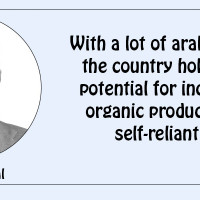- Saturday, 25 October 2025
Neglected Handwashing Stations
In March 2020, as the country began detecting its first cases of COVID-19, the government and health experts began urging people to wash their hands with soap and water to prevent contracting the novel coronavirus from potentially infected people and contaminated surfaces. Telecom service providers began including messages and jingles to promote handwashing in their caller ring back tunes and organisations started distributing flyers and pamphlets.
But, when out on the roads, handwashing was easier said than done and people who wanted to clean their hands had to look for stone spouts or public taps or go into shops and malls to find water. And even if one found water, finding a good antiseptic soap or handwash was another challenge.
To mitigate this problem and promote hand hygiene, various groups and institutions began setting up handwashing stations in the form of roadside stalls which consisted of water tanks, taps and soaps or handwashing gels in different locations around the Kathmandu Valley. The state-owned Kathmandu Upatyaka Khanepani Limited (KUKL), which supplies drinking water to the houses of the valley, was one of the first companies to participate in this initiative and its branch offices spent their own money to place such stations in New Road, Thapathali, Tripureshwor, Ratnapark, Baneshwor, Maharajgunj and several other busy centres around the capital.
The idea was that one, people would see these prominent sanitation posts and be tempted to wash their hands and two people seeking to wash their hands would get access to clean water and anti-germ soap.
These stations proved a great hit. People began queuing up to wash their hands and other organisations in other parts of Kathmandu and the country began setting up similar stalls. People and communities also implemented the ideas in their localities and it looked like the country had taken to handwashing in a dedicated and permanent way.
However, after about a year, the number of daily coronavirus infections began decreasing and the fear of getting the disease started subsiding. The virus was still a threat, but the people were no longer scared of it. The country’s attitude shifted from a frightened “We must avoid catching COVID at all costs” to an indifferent “Getting it will put me out of action for a couple of weeks but that’s that. It does not matter”. So, people stopped taking precautions and they stopped washing their hands as rigorously. As a result, the handwashing posts fell into disuse and disrepair.
The tanks KUKL spent so much money on setting up were without water, there was no soap and the taps were broken. The water supplier repaired a few but with no regular users, it had no incentive to keep the posts working.
However, it was not just public apathy that killed this good idea. It was also the stay-at-home orders imposed by the authorities and the restrictions on public gathering and mobility.
The handwashing stalls began to pop up in the first week of March 2020. However, before the second week was over, the federal government had imposed a nationwide lockdown. This made them useless. When people are not allowed to leave their homes, naturally they will not have any use for roadside posts. And when people stop using something, they also stop maintaining it. Thus, the community and NGO-installed water tanks also went the way of the KUKL.
As 2020 turned into 2021 and 2022, the cases and the fear around COVID declined further and the handwashing stations went from being a utility to an eyesore. Thus, they were dismantled. Today, only a few remain.
This is a tragedy because these stations were a good idea. They promoted a good habit and made people aware of sanitation. Moreover, handwashing is not just needed for COVID. Keeping one’s hands clean can prevent diarrhoea and respiratory infections and may also help prevent skin and eye infections. In fact, research shows that washing hands reduces the number of people who get diarrhoea by up to 40 per cent, reduces illnesses like colds by 21 per cent and decreases gastrointestinal illness in schoolchildren by around 57 per cent.
However, we had a very myopic view towards hand hygiene. We did not really wash our hands much before the pandemic hit and have again stopped washing our hands now that we think it has passed which is a shame because the habit and these stalls could have gone a long way in promoting public health.













